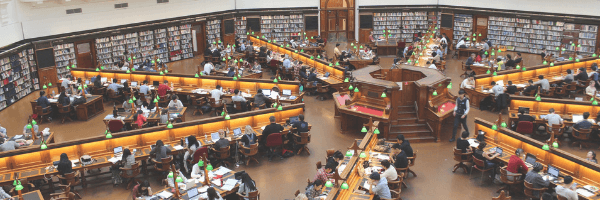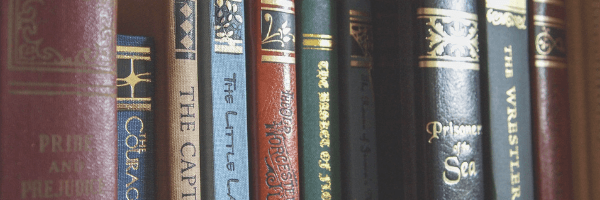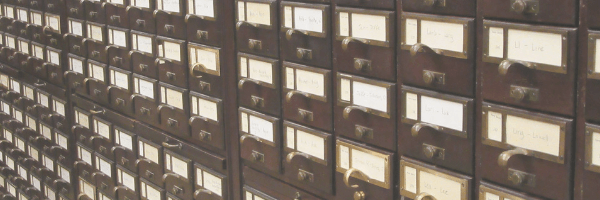This is part of the series of blog articles called “A Writer’s Guide…”. The purpose of this series is to give detailed information on skills and occupations that writers can use when creating characters.
Check out this article by writer Alana Boltz on Librarianship.
Librarianship
by Alana Boltz
So, you have a librarian character who needs fleshing out. Or maybe you have scenes set in a library and want it to seem realistic.
Either way, you’ve come to the right place. Here are some of the things you may need to know about what librarians do, how libraries are run, and other useful information.
Disclaimer: Because librarianship is such a huge field, I want to give the disclaimer that my experience isn’t universal.
Librarians sometimes specialize, and as you’ll see below, there are many different places one might work. I am a law firm librarian in the US, but I have also worked in archives (oral history) and a public library as a paraprofessional.
However, many of the skills are transferable, and I should at least be able to give the basics.
What are librarians?

This isn’t a trick question. People tend to think of librarians as only working in a library, tending to dusty books, but librarians can work in a variety of different settings, and many don’t even handle books.
In a nutshell, librarians find, organize, and provide access to information. Some librarians have additional duties such as teaching classes, organizing community events, or doing academic research, but information is pretty much at the core of the profession.
What kind of education do you need to be a librarian?
In order to apply for most librarian positions, you need to have a masters in library science (MLS).
Unlike many degrees, you don’t have to have an undergraduate degree in library science to get a masters in it, but you do need a bachelor’s degree of some sort. Academic librarians may need a second masters in their field of specialization.
Librarians come from all sorts of different academic backgrounds. Many are former English or History majors, but pretty much any background is possible. You don’t typically need a Ph.D. unless you want to be a professor of library science.
- Not everyone who works in a library is a librarian. Bigger libraries will often have a variety of paraprofessionals to keep everything running smoothly. While librarians typically are the ones who handle reference and cataloging work, basic tasks such as checking in books, shelf reading (ie, making sure the books are in order on the shelf), and helping patrons with the computers tend to be delegated to paraprofessionals. In an academic library, many of these roles are filled by students. Traditionally what separates librarians and paraprofessionals is the MLS, but in my experience, a fair number of paraprofessionals are either current library school students trying to get experience or people who already have the degree but haven’t been able to find a full librarian job yet.
Where do librarians work?

In a library, you might reply. In fact, there are many different types of libraries and archives, and some librarians don’t work in a library at all.
Public libraries
This is probably the place most people think of when they think of libraries. In addition to physical books, some also lend out audiobooks, movies and sometimes even video games.
Many of them also serve as community centers and offer a variety of different services and programs.
Academic libraries
Typically these serve the students and professors at a university and have more specialized collections than a public library.
Depending on the size of the school, there may be specialized libraries around campus for the different departments. Members of the public may be able to get a library card there if it’s a public/state school.
Archives
Archives typically house unique or specialized items that don’t leave the building, such as personal papers, rare books, or photographs.
You typically have to sign in to get access, and there may be further restrictions depending on what kind of archive it is.
There are also digital archives, which can include both digitized items or items that are born digital (ie, were created in a digital format rather than being scanned in or recorded from analog sources).
Special libraries
These libraries are typically on a specific topic (ie, law, business, etc.) and are often restricted in use to members of the organization they are a part of.
Large private companies will sometimes have their own libraries, which may include reference materials useful to the company, company history, and online resources such as databases.
Schools

Public schools (elementary school through high school) will often have their own libraries. School librarians typically need more certification than other types of librarians.
Non-libraries
Research and organization skills are useful in a variety of ways, and library science graduates might end up using their skills outside of the traditional library setting.
Some of these other career paths might include records management, research, and database creation.
What do librarians do at work all day?
Just as there are different types of libraries, there are also different types of librarians. If you’re at a bigger library, your job will likely be more specialized.
This is often reflected in job titles- ie, reference librarian, instructional services librarian, etc. At a small library like mine, my supervisor and I end up doing a little bit of everything.
Reference
One of the core parts of librarianship, reference involves finding information and answering patron questions.
At a public or academic library, there will likely be an actual reference desk, where the librarian on duty sits. Sometimes patrons are looking for a book or online resource the library has or a recommendation of what to read next, but sometimes they are looking for reliable information.
This can include research for a paper, hobbies, or information on how to obtain various public services.
- Academic and special libraries often have access to a variety of specialized databases, which are often available to patrons with a library card or login information. However, there are also a lot of free resources like Google Scholar or government websites out there.
- Typically we use Boolean searching to craft searches that will only pull up things you want without any false hits (things that aren’t actually related but have some of the same words).
Cataloging

While reference focuses on finding resources, cataloging makes resources findable even when there are thousands of them in a catalog.
There’s no point in having a book or other resource if you can’t find it when you need it. The aim of cataloging is to help users find the resource they need in a variety of different ways.
Sometimes you don’t know the title of a book, but you know the author. Or maybe you remember part of the title and when it was published, but nothing else. Or maybe you’re looking for all the books you can find on a given topic. Cataloging is designed to help you in any of these scenarios or many others.
- There are many complicated rules for cataloging resources that I won’t go into. (Contact me if you want to know more) However, I’d like to point out that not all libraries use the Dewey Decimal system. It’s commonly used by public libraries or for smaller collections, but many academic and special libraries in the US use Library of Congress (LC) classification. Some libraries use both for different parts of their collections (ie, LC for nonfiction, Dewey for fiction), but this varies depending on the needs of the institution.
Teaching
Academic librarians will sometimes be required to teach classes or seminars on information literacy (ie, how to find and evaluate sources). Some may even be tenured professors, especially at bigger universities.
Programming and Leading Events
Public libraries have taken on many aspects of general community centers in the past 10-15 years.
Public librarians may need to plan, coordinate, or lead community events held in the library. This can be everything from the summer reading program to movie screenings to NaNoWriMo events.
Repairing and Maintaining Books

Books that circulate can take a lot of damage, especially paperbacks. Sometimes they are too far gone, but the rest of the time the library will patch them up and put them up on the shelf.
Children’s books are especially likely to come back either torn, bent, dirty, or all of the above. I worked in circulation in a public library, and I learned quickly that if I didn’t wear gloves, my hands would quickly get grimy.
A few other things to keep in mind when creating librarian characters:
There are a lot of stereotypes about librarians, most of which are at least a few decades out of date. A few have a grain of truth in them, though.
- Librarian demographics tend to skew white and female, although librarians can be of any background. As a profession, we tend to be a little more politically liberal, but of course, there are exceptions.
- Most libraries aren’t nearly as quiet as you might expect, so shushing people isn’t really a thing like it once was.
- While it is a profession that attracts introverts, it is at its heart a customer service job. People skills are a must.
~ ~ ~ ~ ~ ~ ~ ~ ~
About Alana Boltz
 Alana is a horror writer, classical singer, and law librarian.
Alana is a horror writer, classical singer, and law librarian.
She lives in Lexington, Kentucky.
Her current project is a gothic horror novel about families, ghosts, and the things we do to keep our loved ones safe.
She can be found online at the following location.
I hope you enjoyed this article and if you have any questions for Alana, drop them in the comments below. Check out all the current “A Writer’s Guide” articles on their new page for easy access.
Do you have knowledge of a skill or occupation you could write about?
~ ☆ ~ ☆ ~ ☆ ~ ☆ ~
Happy writing

Ko-Fi ☆ Twitter ☆ Facebook ☆ Instagram ☆ GoodReads ☆ Pinterest ☆ LinkedIn ☆ Tumblr




Pingback: Want to be part of the Writer’s Guide?
Great post. I think it would be so cool to be a librarian.
Reblogged this on Author Don Massenzio and commented:
Check out this interesting post from Ari Meghlen’s blog with A Writer’s Guide… to Librarianship
Thank you for reblogging this article, Don. 🙂
You’re welcome
Reblogged this on Chris The Story Reading Ape's Blog and commented:
To read the full article, click on the words: View Original Post – bottom left of image below
Thanks for reblogging 😀
Welcome, Ari 👍😃
I work in a small academic library, and people assume that I’m a librarian. I’m not; I’m the circulation clerk. You’re so right when you say librarians do more than people realize. They are jacks of all trades in some places – they are the people that know things, and if they don’t know it off the top of their heads, they know where to find it. I’ve thought about going back to school and getting my MLS.
Thanks for reading.
Having worked in a library setting for a long time (and holding a Master’s in Library and Information Science), a lot of this rang true for me.
Thanks so much for reading. 🙂
You’re welcome.